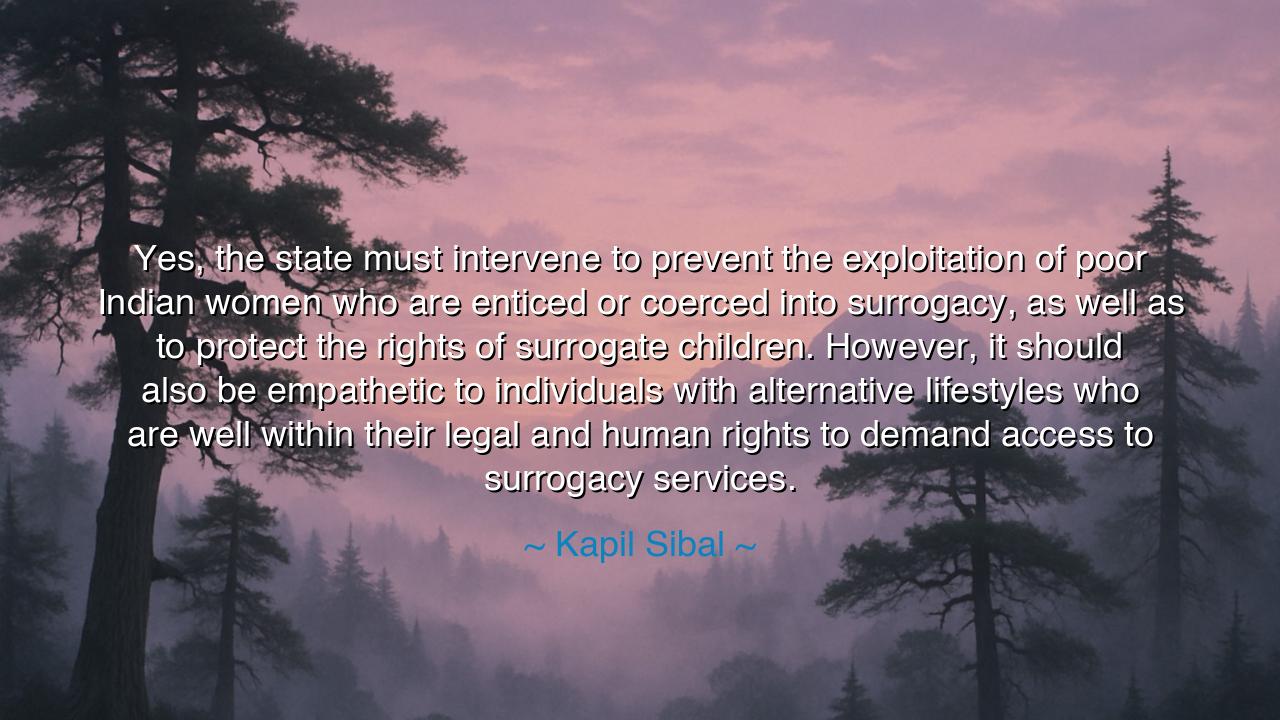
Yes, the state must intervene to prevent the exploitation of poor
Yes, the state must intervene to prevent the exploitation of poor Indian women who are enticed or coerced into surrogacy, as well as to protect the rights of surrogate children. However, it should also be empathetic to individuals with alternative lifestyles who are well within their legal and human rights to demand access to surrogacy services.






The words of Kapil Sibal, “Yes, the state must intervene to prevent the exploitation of poor Indian women who are enticed or coerced into surrogacy, as well as to protect the rights of surrogate children. However, it should also be empathetic to individuals with alternative lifestyles who are well within their legal and human rights to demand access to surrogacy services,” rise like a beacon in the moral twilight of modern society — a call to balance justice and compassion, law and empathy, protection and freedom. In his words, we hear not the voice of command, but of discernment; not the cry of ideology, but the wisdom of moderation. Sibal speaks to the heart of civilization’s eternal struggle: how to uphold virtue without extinguishing liberty, and how to guard the vulnerable without hardening the heart against those who seek new paths of life and love.
The origin of this quote lies in India’s long and complex debate over surrogacy, that profound union of science and longing, where life is born not from the womb of nature alone, but through the will of human compassion and technology. For years, India stood as a global hub for surrogacy, where many poor women, driven by poverty, offered their bodies to carry children for others. The practice brought both joy and sorrow — joy to childless couples, but sorrow to those women who were often exploited, underpaid, or abandoned when complications arose. In the face of such exploitation, the state was called to act — to shield the weak, to preserve dignity, and to define the sacred boundaries of life itself. Yet, as Sibal reminds us, law must be a sword with two edges — firm in justice, but guided by mercy.
At the heart of his statement is the recognition of two moral imperatives. The first is protection: that society must never turn a blind eye to exploitation, no matter how noble the cause. Women of poverty must not become instruments of profit in the hands of the rich. Their wombs are not commodities, but sanctuaries of creation. In this, Sibal echoes the wisdom of the ancients, who taught that power without restraint corrupts the sacred. Like the lawgivers of Athens and the philosophers of India, he declares that justice must shield the vulnerable first — that the greatness of a civilization is measured by how it protects those with the least power.
The second imperative is empathy. Sibal calls upon the state not to wield its authority as a hammer, but as a healer — to recognize that in the modern world, love and family take many forms. Those who live with alternative lifestyles, who walk paths once deemed unconventional, are nonetheless part of humanity’s great chorus of diversity. To deny them the right to parenthood, he argues, is to deny them their full measure of humanity. Just as the ancients once widened the circle of citizenship to include those once excluded, so must modern societies expand their vision of family to reflect the truths of the age. The law that protects the poor must also respect the free.
History, too, offers its parable. Consider the story of King Solomon, who was asked to judge between two women claiming to be the mother of one child. His wisdom lay not in choosing one over the other, but in perceiving the deeper truth of love — that the real mother was not the one who demanded possession, but the one who sought the child’s life to be spared. So too does Sibal’s wisdom lie in discerning that true justice in matters of surrogacy cannot belong to ideology alone, but must spring from compassion for all — for the woman who carries the child, for the child who is born, and for those who yearn to be parents. Justice without empathy is cruelty in disguise; empathy without justice is chaos without virtue.
The lesson of Sibal’s words is thus eternal: in governing the complexities of human life, the state must walk the path of balance. The law must be vigilant to prevent exploitation, yet tender enough to protect freedom. To those in power, he teaches humility — that to legislate life is to touch the divine, and must be done with reverence. To the people, he offers hope — that compassion and reason can coexist, and that progress need not come at the cost of dignity.
Let these words be passed down as a guide for every age: when you seek to do good, do not do it with a single eye. Look always to both sides — to the weak and to the free, to protection and to liberty. For the measure of a just society is not how loudly it claims to protect, but how wisely it chooses to care. As Kapil Sibal reminds us, the state that acts with both empathy and integrity becomes not merely a ruler of people, but a guardian of humanity itself. And in that union of law and love, civilization finds its highest form — not the dominance of power, but the harmony of compassion and justice.






AAdministratorAdministrator
Welcome, honored guests. Please leave a comment, we will respond soon